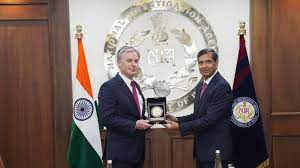How a former US ambassador who became a Cuban spy eluded detection for decades
MIAMI: Manuel Rocha was well-known in Miami’s social circles for having an aristocratic, even royal, demeanor that looked appropriate for a career US diplomat with an Ivy League education who held important positions in the White House, Bolivia, Argentina, and Cuba. “Ambassador Rocha,” as he wished to be addressed, made demands and was granted them.
Felix Rodriguez, a former CIA agent, was skeptical in 2006 when a defected lieutenant colonel from the Cuban Army came up at his Miami home with a shocking tip: “Rocha is spying for Cuba,” the guy reportedly said.

Rodriguez thought at the time that the Rocha tip was an effort to defame a fellow anti-communist activist. Rodriguez had taken part in the 1961 Bay of Pigs invasion in Cuba and the murder of revolutionary “Che” Guevara.Despite this, he claimed to have sent the defector’s note to the CIA, which shared his skepticism.
“Nobody took him seriously,” Rodriguez told AP. “We all thought it was a smear.”
When Rocha, now 73, was detained and accused of working as a secret agent for Cuba as early as the 1970s, the long-ago tip suddenly became crystal clear again. Prosecutors referred to this as one of the most egregious and sustained betrayals in US State Department history.
An FBI undercover agent surreptitiously filmed Rocha praising Fidel Castro as “El Comandante” and boasting about his efforts for the communist government of Cuba, calling it “more than a grand slam” against the US “enemy.” Prosecutors and associates claim that Rocha has been disguising his actual allegiances by posing as a fierce opponent of the island country and supporting Donald Trump in recent years.
“I want to look (Rocha) in the eye and ask him why he did it,” said an enraged Rodriguez. Everything was at his disposal.”
The FBI and state department investigators are trying to figure out the most important piece of information missing from the case—exactly what the career diplomat may have handed up to Cuba—as Rocha entered a not guilty plea to 15 federal offenses this week while being held in prison. It’s a secret damage assessment that will likely take years, made more difficult by the sometimes enigmatic world of intelligence.
Not only was Rodriguez’s tipster—whom he declined to identify to the AP but claims to have been examined by the FBI recently—involved. AP was informed by officials that the CIA knew in early 1987 that Castro had a “super mole” buried deep inside the US government. There are now suspicions that it was Rocha, and that the FBI may have had him on a short list of potential Cuban agents since at least 2010 among influential people in foreign policy circles.
Messages asking for reaction from Rocha’s lawyer were not returned. Requests for comment were not answered by the State Department, the FBI, or the CIA.







